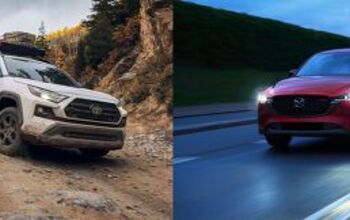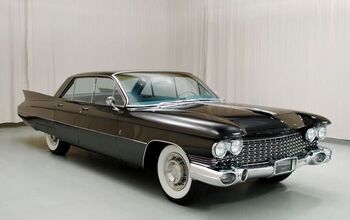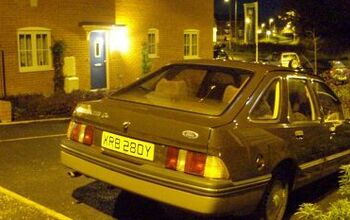The Six People You Meet In the Car Business

I spent 33 years in the automobile business, the equivalent of 96 human years. Having worked for car dealerships, manufacturers, an auction house, and an auto finance company, I’m convinced there is no other industry that attracts such a diverse cast of characters. Many of them defied stereotypes: I met car sales people who were honest, ethical and hardworking. I also worked with senior executives of well-respected automobile companies who were total sleazebags.
Throughout the years, I kept meeting the same set of six people over and over. These are their stories. Their names have been changed to protect the guilty.
1. The rock star car salesperson who gets fired everywhere he works.
I first met “Perry” at a Honda dealership in Louisiana in 1986. A rotund enthusiastic person, Perry was one of the best sales people I’d ever seen. Stick him on any showroom floor and he would move 20 cars per month, every month. Customers absolutely adored him.
Perry would never last long at a store because he possessed an ability to piss off every one of his co-workers and managers. I’m not talking about the normal jealously by other sales people here. I’m talking about mild-mannered employees running into their general manager’s office and screaming, “Either Perry goes or I go!”
Perry was fired from one job shortly after he sold a car and took the deal into the F&I office and told the long-time finance director, “Don’t fuck this up!”
The car business being a small, inbred industry would result in me bumping into Perry several more times, once while he was selling Mercedes-Benz vehicles in Texas in 2003. I last heard he was at a luxury car dealership in Arizona in 2014.
2. The rock star car salesperson who should get fired, but doesn’t.
A fellow we’ll call “Reed” is a top salesperson at a West Coast dealership and is as big a pain in the ass to his peers as Perry. When his company opened a second same-franchise location across town, it was policy that there would be no cross-selling by sales people. Reed threatened to quit unless he was allowed to work customers at both stores and dealership management relented.
When Reed’s manager moaned to a management consultant that he could not terminate the prima donna “because he sells 30 cars a month,” the consultant responded, “You have two choices. Fire him and hire two salespeople who can each sell 15 cars per month or hire three who can each sell 10 a month.”
Reed is still employed there.
3. The dealership owners who know everything about the car business except what’s going on inside their own stores.
As an Automotive News junkie, I loved talking about the car biz with these dealer principals. They may only own a Chrysler franchise but can talk at length about what is going on at BMW and Toyota. Still, they’re a little hazy when asked about their salespeople’s incentive plans. These types like to volunteer to be on manufacturer’s dealer advisory boards. They also tend to have time-consuming high-dollar hobbies, be it a Beechcraft, boat or blackjack.
The problem is that there is a relationship between this type of mentally absent owner and employee theft. It sometimes seem like automobile dealers are the easiest companies to steal from. Recent stories about millions of dollars in employee embezzlement can be found here and here and here.
I was once calling on such a dealer principal when he discovered that his lowly lot attendant supervisor had swiped $1.1 million dollars from his store by creating and submitting phony time cards to the accounting office. Curiously, in this case and most of the others, it seemed the managers who should have caught the capers were never terminated.
I wonder if this dealer principal told the FBI when they were investigating the case, “Yeah, but I just read in ‘WardsAuto Dealer’ about the Chevy store in Buffalo who lost two million dollars to their title clerk … ”
4. The sleazy general managers of publicly held dealerships
The rise of large, publicly held dealer groups — like Penske, Group 1 and Sonic — has not been looked upon kindly by car companies. Automakers want their franchised dealers to have an owner on the premises, someone who can solve customer issues face-to-face, which does not happen with the “publics.” Instead, each store has a revolving door of general managers, whose “owner” — the dealer group’s headquarters — is typically hundreds of miles away. This can lead to problems.
Let’s use one group as an example: an anonymous dealer group that sells autos all over the nation. I have called on five of its dealerships. This public was without peer when it came to dirtbag general managers.
Let’s start with a high-line GM we will call “Duck.” Despite me being a supposed expert on the subject of corruption in the car business, he taught me a new trick. While attending a golf tournament put on by his captive finance bank, Duck thought he would curry the bank’s favor in hopes of them approving more of his credit-challenged customers. He proceeded to slip $1,000 in cash into the gym bag of one of the bank’s credit analysts. The analyst reported the attempted bribe, but nothing came of it as Duck was later promoted to a Regional Manager of the dealer group.
In another case, an automotive finance company hired one of the auto group’s Regional Finance Managers and terminated him three weeks later because it turned out he a was a serial sexual harasser, and by all accounts his former employer turned a blind eye to his activities.
The topper was the general manager in the group whose auto manufacturer awarded him a free trip to the Masters golf tournament. Like a lot of Masters corporate attendees, he was housed in a luxury private home, which he and his guest proceeded to trash after a night of drinking. As you might have guessed by now, he kept his job.
Want job security in the car business? Join a publicly held dealer group.
5. The car company sales executive who has zero enthusiasm for cars
When I was hired by the sales division of American Honda, I assumed I’d be joining a colony of car nuts like myself.
I was wrong.
Naturally, my peers all possessed great enthusiasm and product knowledge about Honda vehicles, but there were very few true automobile aficionados among them. The good thing about Honda was their motorcycle division folks were all gearheads and a high percentage of the engineering staff had something interesting parked in their garages. I’d later learn this phenomenon is common at most automobile companies.
I experienced an exception to this rule during the time my employer Mercedes-Benz owned Chrysler. We attended a meeting at DaimlerChrysler headquarters in Detroit on the day of its annual employee car show. There were a couple hundred vintage Chrysler cars on display, from Chargers and SuperBirds to Valiants and Belvederes. Some of their old timers showed pristine American Motors vehicles. We also toured the now-defunct Walter P. Chrysler Museum, but it did not compare to the employee extravaganza.
There were some serious automobile enthusiasts at Chrysler back then.
6. The dealership owners who take wonderful care of their employees and customers
These folks at Newton Nissan of Gallatin, Tennessee, are celebrating being named “#1 Nissan Dealer in America” in 2017 for the second consecutive year by shoppers on customer satisfaction website DealerRater. I don’t know this store, but I guarantee it’s a great place to work.
There is no question that happy employees make for happy customers.
I know one Midwest store where the owner takes his managers on quarterly trips, be it to the Final Four basketball tourney, Cabo or just renting out a local restaurant. Needless to say that dealer has low employee turnover, high customer satisfaction ratings and makes a ton of money.
I have worked with numerous such stores, but they sadly only represent about 15 percent of the U.S. dealer body. The rest are content with high turnover, particularly among salespeople, and their managers make a sport out of cutting pay plans. (And with the right franchise and/or location, it is easy to see why. If the dealership is profiting a couple million dollars a year, owners feel there’s no need for any strategy to attract and keep top-notch employees.)
There’s a crisis brewing in the car business of dealers not being able to find qualified technicians to go along with the continuing challenge of attracting good salespeople. In addition, new car sales are forecasted to fall from their current torrent pace. The result of all this will be a widening gap in sales and profitability between the dealerships who have coddled their team members and guests over the years and those who have not.
And, like in the last recession, some of those dealerships will not survive.
[Image: Prostock-studio/Shutterstock.com]
Become a TTAC insider. Get the latest news, features, TTAC takes, and everything else that gets to the truth about cars first by subscribing to our newsletter.

More by Steve Lynch
Latest Car Reviews
Read moreLatest Product Reviews
Read moreRecent Comments
- Steve S. Steve was a car guy. In his younger years he owned a couple of European cars that drained his bank account but looked great and were fun to drive while doing it. This was not a problem when he was working at a good paying job at an aerospace company that supplied the likes of Boeing and Lockheed-Martin, but after he was laid off he had to work a number of crummy temp jobs in order to keep paying the rent, and after his high-mileage BMW was totaled in an accident, he took the insurance payout and decided to get something a little less high maintenance. But what to get? A Volkswagen? Maybe a Volvo? No, he knew that the parts for those were just as expensive and they had the same reputation for spending a lot of time in the shop as any other European make. Steve was sick and tired of driving down that road."Just give me four wheels and a seat," said Steve to himself. "I'll buy something cooler later when my work situation improves".His insurance company was about to stop paying for the rental car he was driving, so he had to make a decision in a hurry. He was not really a fan of domestics but he knew that they were generally reliable and were cheap to fix when they did break, so he decided to go to the nearest dealership and throw a dart at something.On the lot was a two year old Pontiac Sunfire. It had 38,000 miles on it and was clean inside and out. It looked reasonably sporty, and Steve knew that GM had been producing the J-car for so long that they pretty much worked the bugs out of it. After taking a test drive and deciding that the Ecotec engine made adequate power he made a deal. The insurance check paid for about half of it, and he financed the rest at a decent rate which he paid off within a year.Steve's luck took a turn for the better when he was offered a job working for the federal government. It had been months since he went on the government jobs website and threw darts at job listings, so he was surprised at the offer. It was far from his dream job, and it didn't pay a lot, but it was stable and had good benefits. It was the "four wheels and a seat" of jobs. "I can do this temporarily while I find a better job", he told himself.But the year 2007 saw the worst economic crash since the Great Depression. Millions of people were losing their jobs, the housing market was in a free fall, people were declaring bankruptcy left and right, and the temporary job began to look more and more permanent. Steve didn't like his job, and he hated his supervisors, but he considered himself lucky that he was working when so many people were not. And the federal government didn't lay people off.So he settled in for the long haul. That meant keeping the Sunfire. He didn't enjoy it, but he didn't hate it either, and it did everything he asked of it without complaint.Eventually he found a way to tolerate his job too, and he built seniority while paying off his debts. There was a certain feeling of comfort and satisfaction of being debt-free, and he even began to build some savings, which was increasingly important for someone now in their forties.Another bit of luck came a few years later when Steve's landlord decided to sell the house Steve was renting, at the bottom of the housing market, and offered it to Steve for what he had in it. Steve's house was small and cramped, and he didn't really like it, but thanks to his savings and good credit he became a homeowner in an up and coming neighborhood.Fourteen years later Steve was still working that temporary job, still living in that cramped little house that he now hated, and still drove the Sunfire because it wouldn't die. For years now he dreamed of making a change, but then the pandemic happened and threw the economy and life in general into chaos. Steve weathered the pandemic, kept his job when millions of people were losing theirs, and sheltered in place in that crummy little house, with Netflix, HBO, and a dozen other streaming services keeping him company, and drove to and from work in the Sunfire because it was four wheels and a seat and that's all he needed for now.Steve's life was secure, but a kind of dullness had set in. He existed, but the fire went out; even when the pandemic ended and life returned to normal Steve's life went on as it had for years; an endless Groundhog Day of work, home, work, home. He never got his real-estate license or finished college and got his bachelor's, never got a better job, never used his passport to do some traveling in Europe. He lost interest in cars. "To think how much money I wasted on hot cars when I was younger", he said to himself. He never married and lost interest in dating. "No woman would want me anyway. I've gotten so dull and uninteresting that I even bore myself".Eventually the Sunfire began to give trouble. With 200,000 miles on the clock it was leaking oil, developing electrical gremlins, and wallow around on blown-out shocks. Steve wasn't hurting for money and thought about treating himself to a new car. "A BMW 3-series, maybe. Or maybe an Alfa Romeo Giulia!" He began to peruse the listings on Autotrader. "Maybe this is just what I need to pull out of this funk. Put a little fun back in my life. Yeah, and maybe go back to the gym, and who knows, start dating again and do some traveling while I'm still young enough to enjoy it!"Then his father passed away and left him a low-mileage Ford. Steve didn't like it or hate it, but it was four wheels and a seat, and that's all he needed right now."Is it too late to have a mid-life crisis?" Steve thought to himself. For what he needed more than that stable job, that house with an enviably small mortgage payment, and that reliable car was a good kick in the hindquarters. "What the hell am I afraid of? I should be afraid that things will never change!"But the depression was like a drug, a numbness that they call "dysthymia"; where you're neither here or there, alive or dead, happy or sad. It was a persistent overcast, a low ceiling that kept him grounded. The Sunfire sat in his driveway getting buried by the needles from his neighbor's overhanging pine trees which were planted right on the property line. "Those f---ing pine trees! That's another thing I hate about this damn house!" Eventually the Sunfire wouldn't start. "I don't blame you", he said to the car as he trudged past it to drive the Ford to another Groundhog Day at that miserable job.
- Yuda Cool. Cept we need oil and such products. Not just for fuel but other stuff as well. The world isn't exactly ready to move to wind and solar and whatever other bs, the technology simply isn't here yetNot to mention it's too friggin expensive, the equipment is still too niche and expensive as it stands
- Rna65689660 Picked up my wife’s 2024 Bronco Sport Bad Lands!
- Inside Looking Out Android too.
- Ajla I'm replacing the transmission in a 2006 GMC van.


































Comments
Join the conversation
Rich Corinthian Leather
Worked my way through 2 years of college selling Mazda's and all Honda products except cars. This was early '80s in a relatively small town. Myself and 3 others, 1 female who was attractive, friendly and pretty ethical, but new little about cars and less about math. One guy was an old-timer, super nice grandfatherly type, moved at his own pace, had been there awhile and had built a small but loyal clientele who would refer others to him. The third was a real lick, late middle age, smug, knew next to nothing about product and was proud of it. I took the job to be the motorcycle guy but in the day Mazda had the Gen 1 RX-7 that was still popular, the GLC that was cheap and the B2000 pick up that was advertised in base version at $5995. Those things flew out the door which was good because I thing there was about $200 in the deal if you couldn't talk the customer into a $249 step bumper or the $800 dealer installed A/C. Most people declined and drove out with the stripper. I was the only real car guy and while the Mazda line-up was generally a good one, they were a fringe brand in a small market and I had more fun selling and demoing bikes. But the new FWD 626 came out and I really loved them. Daily we'd have customers seeing the Honda sign and come in looking for an Accord. At first I'd explain what we had and try to show them a 626. Eventually I stopped explaining and just showed them the car, typically a LX trim. If I could get them to drive it, about half eventually bought a Mazda after getting horrible treatment and crazy pricing at the Honda dealer. I learned a lot about sales, even more about cars and a tremendous amount about people and leadership. A great 2 years.